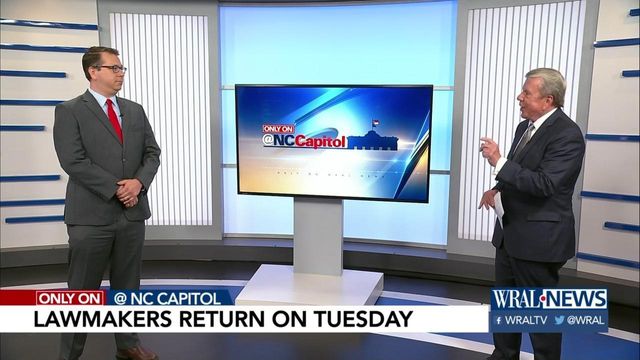Big difference in COVID-19 budget numbers as NC legislative session opens
The North Carolina House and Senate plan to gavel in at noon Tuesday, though the floor sessions that day will likely be pro forma. The Senate plans to hold floor votes Wednesday, meaning senators should have a largely finished bill or bills by then.
Posted — UpdatedThe state Senate hadn't released a plan publicly as of late Monday afternoon, but Cooper said late last week that he believes the Senate's number is lower than his.
Just how the Senate developed its plan isn't clear. The House has working groups that met remotely, streamed over the internet. The Senate has not held public meetings.
Both chambers plan to gavel in at noon Tuesday, though the floor sessions that day will likely be pro forma. The Senate plans to hold floor votes Wednesday, meaning senators should have a largely finished bill or bills by then.
It's unclear what Senate committees will meet and when. No schedule had been posted as of Monday evening.
The House plans to tweak its proposals in virtual committees Wednesday, then hold floor votes Thursday, according to chamber leadership.
Both sides will have to come to an agreement on bill language and numbers and send final products to the governor for his signature. The session is expected to deal almost exclusively with COVID-19 issues and divvy up federal dollars coming to the state in response to the pandemic.
Moore said Monday the state is still waiting on clarity as to whether federal COVID-19 money can be spent that way.
The Legislative Building will be closed to the public during the session, though credentialed press will be allowed inside. Lawmakers are expected to spread out on the chamber floors to leave room for social distancing.
They may be in session for only a week, though lawmakers are expected to gather again later in the year for a longer session to deal not only with COVID-19 issues but with other state business as well.
In addition to emergency spending, lawmakers have a range of policy issues to tackle. They're expected to delay various deadlines, including for expired driver's licenses and vehicle inspections, and to waive interest on late tax payments.
Moore, R-Cleveland, said one thing the state won't do is move to an all-mail election and automatically mail voters absentee ballots.
The State Board of Elections hasn't requested such a change, but it's gotten some discussion as people around the country look forward to the November elections. North Carolina already allows anyone who wants to vote by mail to do so, but they must fill out a form to request a ballot.
Moore said Monday that, if the legislature needs to tweak state election laws, it will.
• Credits
Copyright 2024 by Capitol Broadcasting Company. All rights reserved. This material may not be published, broadcast, rewritten or redistributed.






